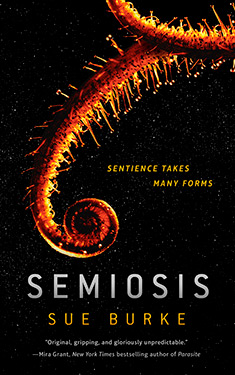Sue Burke
Completed 11/4/2020, Reviewed 11/4/2020
5 stars
The book is like a collection of short stories about the founding and development of a colony ship from Earth that lands on a planet they call Pax. The goal is to create a new Earth without making the same mistakes as they did on Earth. In a way, this book is reminiscent of Bradbury’s The Martian Chronicles, but the stories go together much more directly and sequentially. They were not written independently like TMC. This book is also about first contact, with the life on the planet and with another alien race that had settled on the planet about 400 years earlier. It’s a marvelous book which sucked me in right at the beginning and held me until the end. It was nominated for four awards, including the Golden Tentacle which is awarded for a debut novel that meets the criteria of progressive, intelligent, and entertaining.
A colony ship lands on a planet that has evolved one billion years longer than earth. They find the plant life and some of the animal life to have some form of sentience. They try to create a new paradigm for civilization. At first, the plants seem to be symbiotic with them, then they turn against them, then they come to have a relationship with a rainbow bamboo plant that may be the largest living thing on the Pax. Eventually, they learn to communicate with the plant, named Stevland. They also find evidence of an alien race that lived in a city of glass bricks and domes whom they call the Glassmakers. But as with any new group, there is fighting and dissent as they grow and develop, despite the name Pax. And there is constant battle with the elements, some of the animals, and eventually, the Glassmakers.
The characters development is marvelous. Each chapter is told from the perspective of one of the characters of that generation, and I became attached to each one. I hated seeing each chapter end because I wanted more info about their narrators. But like a collection of short stories, they are each an amuse bouche. The amazing thing is that each character is very unique as is their speaking style. While I loved all the narrators, I particularly loved the rainbow bamboo, Stevland. He (which I use because the other characters do) begins as an aggressive predator trying to draw the Pax community into a symbiotic slavery to care for and nurture it. But as time goes on, it becomes attached to and eventually part of the community. Daresay, Stevland becomes human.
The writing is faced-paced, with some sort of conflict propelling the narrative in each chapter. It’s not very prosy, but Stevland’s narration is very descriptive in how it processes data in relationship to the humans, the other plants, and the native animals it has a symbiotic relationship with. It’s quite astounding actually, and very believable. Stevland also goes into detail on how it and other plants can modify themselves to produce substances in their fruit and other parts so that eaten, the consumers have the desired effect. They can make poison, medicine, narcotics, and nutrients. That’s how the plants manipulate their environment. All of this sounds like hard science, but the author makes it all very accessible. I did not stumble over the science and speculation at all.
The book is about community, change, and xenophobia. It deals with the other as the humans form symbiotic relationships with the plants and animals of Pax. The xenophobia becomes much more apparent when the community is confronted with the Glassmakers. There’s infighting in the group as to whether they can establish friendship with them or should exterminate them. It is not an easy choice as the Glassmakers see the humans as invaders as well.
I give this book five stars out of five. I really loved it. I found it a fascinating take on first contact. Reading other reviews, I guess the intelligent plants trope has been done before, like Day of the Triffids or more humorously in Little Shop of Horrors. But I don’t know if it’s been done to this effect. The book is very readable despite sounding hard-science-y. This is the first book of a duology, so the ending is a little less than satisfying, but the ride was so good, I want to read the sequel.

No comments:
Post a Comment